
I can tell you there's a twist at the end of Matthew Vaughn's directorial debut without giving anything away. That's because Layer Cake is one twist after another, from beginning to end, and you'll never know if you've seen the last one until the credits roll and the lights come up. Maybe there's a crane shot to cue the closing song, but you won't find out from me. You'll need to go through all of the layers of this pop-scored celebration of violence, a gangster/heist movie so familiar that when a character we hardly know sarcastically says, "Who me?" the audience laughs. Someone tells him not to go nuts on the bad guys, and he says, "Who me?" Who is he? We don't know, but his response is all the character development we need because it tells us exactly which cliché to plug into the body moving around on the screen.
He's the witty guy given to violence against people who piss him off. This is his last job. He wants out. And actually it's one of his cohorts who turns out to be the nastier hot-head, suddenly beating a man to a pulp while the soundtrack moves into Top Gun mode. Douglas Sirk did something similar in 1959's Imitation of Life when he staged a sudden street beating to uptempo, percussive jazz, but he audaciously provoked racial questions in the process, his clairvoyant camera swiveling away from the action before anything happened, preferring to watch the characters indirectly via their reflections in a window.
Layer Cake asks no questions and offers no reflections. It's a simple dance of thugs, and the camera is a willing participant. It dips and turns as much as the plot and dissolves between scenes to keep their ingredients from clumping. Dissolving between scenes is another of Sirk's trademarks, but he made women's pictures. This is clearly is a man's picture. Or rather a boy's picture. Once when songwriter Steve Earle was playing a show in Texas he introduced his fellow touring musician, Julie Miller, by announcing that "Texas state law says we have to pretty up the stage once every hour." Earle was kidding, but Vaughn has taken that sentiment to heart, trotting out a female character whenever the film needs a visual charge, whenever a scene needs a dose of hysteria, and whenever a male character needs an excuse to twist his thick neck. As Vaughn understands them, the laws of his genre require it, and he seems happy to oblige.
One scene involving a sniper took me by surprise. It's a brief flourish, purposely disorienting, certainly worth a smile. And I suppose someone interested in who is conning whom might also have fun unravelling the detailed plot, but I didn't bother. To me the movie feels not so much tedious as stale, despite the glossy sheen, like the lacquered, six-month-old cake in a display window, meant to make your mouth water but not, I'm afraid, meant to be eaten.
